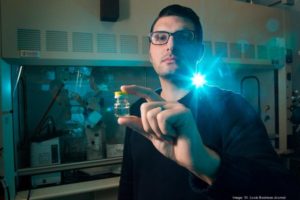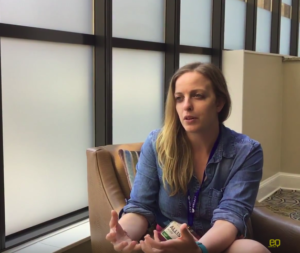
Presented by iSelect Fund
This Biomedical Startup is Taking on Life-Threatening Fibrotic Disease
There is a highly progressive and life threatening disease that affects approximately 130,000 people in the United States. It’s worse than many cancers. According to the National Institute of Health, physicians are unsure of the cause, but the prognosis well-established; affected patients have a median life expectancy of about four years.
St. Louis-based bio-tech company Antegrin Therapeutics believes that that prognosis is unacceptable and is working to improve the lives of patients diagnosed with idiopathic pulmonary fibrosis (IPF).
IPF is characterized by scarring of the lungs causing an irreversible loss of the tissue’s ability to transport oxygen and ultimately resulting in the patient’s inability to breathe. There are currently very few FDA-approved medications to treat this debilitating disease which is often fatal without a lung transplant. George Capps, CEO of Antegrin Therapeutics, describes how Antegrin works to advance fibrosis treatment options.
“Integrins are a family of proteins that promote fibrosis—Antegrin is developing drugs that inhibit integrins,”he explains. “Our drugs are designed to slow the fibrotic process in IPF, as well as in other fibrotic diseases for which effective therapies are not available.”
Capps builds a compelling case for Antegrin’s ability to deliver viable treatment options. He cites his experienced team, strong intellectual property, powerful medicinal chemistry platform and compelling preclinical data, as the key drivers of the company’s potential to transform the lives of patients living with IPF.
“We’ve demonstrated positive efficacy of our compound using inhaled delivery in a model of pulmonary fibrosis,” Capps says. “We are very excited about this since inhaled delivery targets the drug to the organ, minimizing exposure, increasing our odds of excellent long-term safety.
In 2013 the team published a paper in Nature Medicine demonstrating efficacy of an Antegrin compounds in models of lung and liver fibrosis.
“The Nature Medicine publication was really a feather in our cap,”Capp says. “It’s one of the most prestigious medical journals.” The paper not only reports Antegrin’s initial preclinical data, but also details the scientific rationale for the company’s approach. Since the publication of that paper, Capps notes that there has been “an unusually high level of incoming interest in Antegrin from big players in the industry.”
While there is a broad spectrum of fibrotic diseases, Capps is laser-focused on Antegrin’s go-to-market strategy.
“As a small company, we concentrate on advancing our lead program, which is an inhaled therapy for IPF.” Still, he adds, “we firmly believe that Antegrin’s platform technology presents the opportunity for tremendous value creation and multiple shots on goal.” Capps says the ultimate the goal for Antegrin is an exit by acquisition no later than the completion of a Phase 2 clinical trial in 2019 or 2020.
As the company strives toward its targeted exit date, sourcing investment funding is a constant concern for Capps. He explains, “Because biology is so complicated, biopharmaceutical research is expensive and risky. Of course, the potential returns, should the technology succeed, are correspondingly high. But the large capital requirements and long timelines limit the pool of investors who are sophisticated enough to evaluate the investment opportunity.”
Capps is quick to point out that iSelect, a novel St. Louis based venture investment platform, has been instrumental in accessing accredited investors.
“We launched on the iSelect platform last month. We experienced the intensive due-diligence process that they put their companies through. It’s an arduous process, but iSelect seeks to minimize investors’ risk by doing the diligence work most people don’t have the time or domain knowledge to sort out. I can testify that they do their homework!”
iSelect’s investors recognize that investing in promising early-stage companies like Antegrin is a smart strategy when building a diversified portfolio. Antegrin is working with iSelect to raise $400,000 over the course of the next several months.
With B.S. and M.S. degrees in the Biological Sciences and an M.B.A. from Stanford University, Capps clarifies what life is like as the CEO of a bio-tech startup.
“People often think that startups are founded, people work 100 hours a week for six months, and then the company is sold for a billion dollars. That’s usually not what happens, and it is almost never the case in the biopharmaceutical space. Research can be slow and occasionally frustrating. But it is rewarding to work in an entrepreneurial environment with minimal bureaucracy and to be developing meaningful innovations with the potential to transform an people’s health and lifespan in a dramatic way.”






